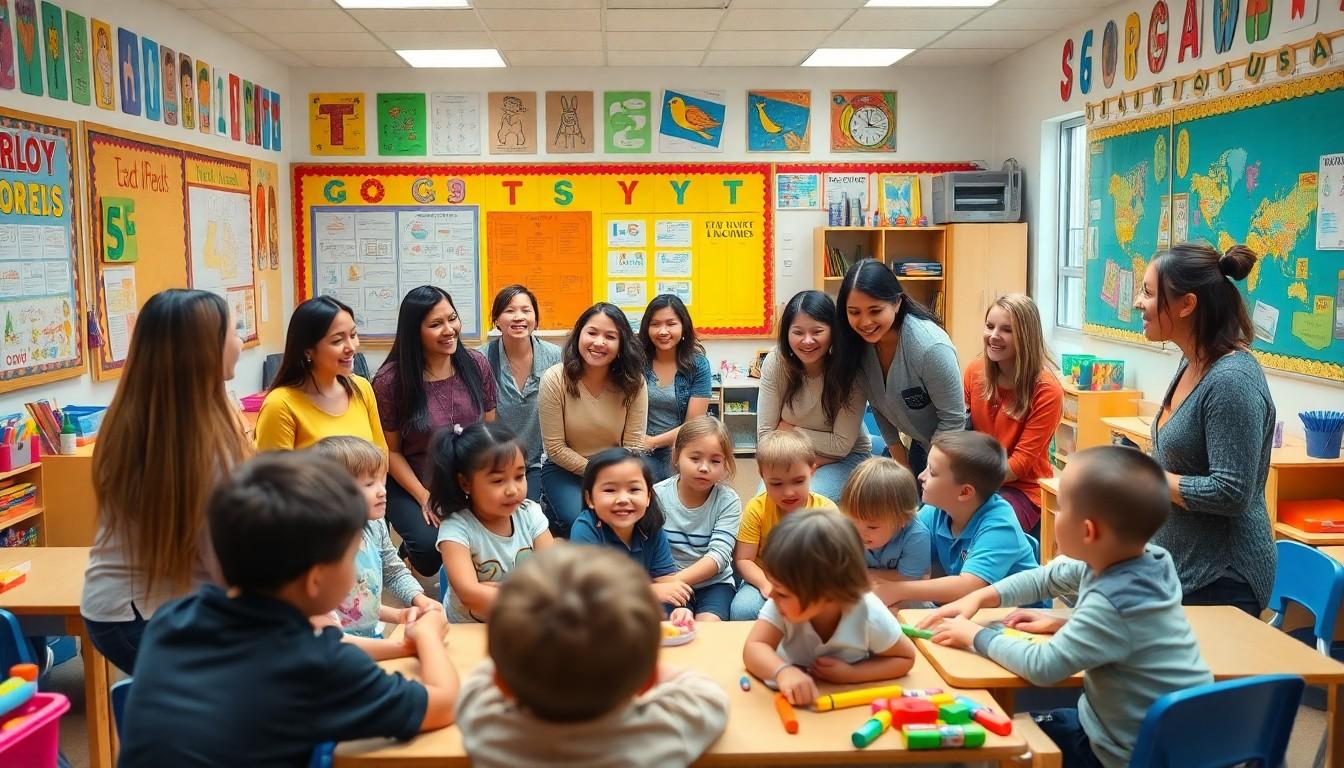Table of Contents
ToggleIn a world where toddlers can outsmart their parents and crayons are considered a primary art medium, pursuing a bachelor’s degree in early childhood education might just be the most rewarding adventure. This degree isn’t just about learning how to sing “The Wheels on the Bus”—it’s about shaping the future, one tiny human at a time.
Imagine guiding curious minds through the wonders of learning while dodging flying blocks and negotiating snack time. With an early childhood education degree, one can transform chaos into creativity and help little ones discover their potential. It’s a career that’s as impactful as it is fun, making it the perfect choice for those who believe that education starts long before kindergarten. So, ready to dive into a world where every day is a new lesson in patience, laughter, and the occasional glitter explosion?
Overview of Early Childhood Education Bachelor’s Degree
An early childhood education bachelor’s degree equips individuals with essential skills for teaching children from birth to age eight. This degree focuses on child development theories, instructional strategies, and classroom management techniques.
In addition to core teaching methods, coursework often includes subjects like language development, literacy, and social-emotional learning. These areas help future educators build a comprehensive understanding of how children learn and grow. Experiential learning opportunities are integral, providing hands-on teaching experiences through internships or practicums.
Graduates of this program typically pursue careers as preschool teachers, kindergarten instructors, or childhood program directors. Some also find roles in policy development or educational research. According to the Bureau of Labor Statistics, employment for preschool teachers is expected to grow by 10 percent from 2021 to 2031, reflecting the increasing demand for qualified professionals in this field.
Often, earning this degree involves state licensure, which enables individuals to teach in public school settings. Candidates must complete a series of assessments and background checks to fulfill licensure requirements.
Networking plays a crucial role in enhancing career opportunities. Many degree programs provide access to professional organizations and job placement services. Participation in these networks can lead to valuable connections within the education sector.
Ultimately, this bachelor’s degree serves as a foundation for those passionate about shaping young minds. The combination of theoretical knowledge and practical experience prepares graduates to make a meaningful impact in early childhood education environments.
Benefits of Pursuing a Bachelor’s Degree

Earning a bachelor’s degree in early childhood education opens numerous doors for educators. This degree not only enhances professional opportunities but also enriches personal capabilities.
Career Opportunities
Graduates can explore various career paths in early childhood education. Positions such as preschool teacher, kindergarten instructor, and childhood program director become accessible. Employment for preschool teachers is projected to grow by 10 percent from 2021 to 2031, indicating a strong demand for qualified educators. Networking through professional organizations significantly enhances job prospects. State licensure often remains essential for securing positions in public settings. Diverse environments, including public schools, private institutions, and community programs offer educators a chance to thrive.
Personal Development
Personal growth is another key benefit of pursuing this degree. Educators develop essential skills that include communication, creativity, and problem-solving. Managing classrooms with young children fosters adaptability and resilience. Engaging in hands-on teaching experiences during internships sharpens practical skills. Understanding child development theories nurtures a deeper insight into children’s needs and behaviors. Lifelong relationships form with fellow educators and students, enriching the professional journey. Passion for early learning translates into a fulfilling career that continuously inspires.
Curriculum and Courses
A bachelor’s degree in early childhood education comprises a well-rounded curriculum designed to equip future educators with essential knowledge and skills. The focus on both core subjects and electives allows for a comprehensive understanding of early childhood education.
Core Subjects
Core subjects form the foundation of early childhood education programs. Coursework typically includes child development, where students explore growth stages and developmental milestones. Language development fosters an understanding of communication strategies that enhance literacy skills. Additionally, students learn instructional strategies that support effective teaching in diverse classrooms. Classroom management techniques are emphasized, ensuring educators can create positive learning environments. The integration of social-emotional learning helps in addressing children’s emotional needs, preparing educators to support overall well-being.
Electives and Specializations
Electives and specializations allow students to tailor their education according to their interests. Options may include courses in special education, providing insights into accommodating children with diverse learning needs. Other electives might focus on curriculum design, equipping educators to develop engaging lesson plans. Some programs offer specific tracks in leadership, preparing students for roles as program directors or administrators. Opportunities also exist for studying family and community engagement, which enhances collaboration with parents and guardians. Choosing electives catering to personal career goals strengthens both expertise and employability in early childhood settings.
Accreditation and Program Quality
Accreditation plays a crucial role in determining the quality of an early childhood education bachelor’s degree program. A well-accredited program ensures that institutions meet established standards in educator preparation and child development practices.
Importance of Accreditation
Accreditation assures prospective students that their education aligns with industry standards. Programs recognized by the National Association for the Education of Young Children (NAEYC) provide credibility to graduates, enhancing their employment prospects. Employers often prefer candidates from accredited institutions since these programs emphasize comprehensive training and adherence to best practices. Accreditation also facilitates access to financial aid and resources, making it more feasible for students to pursue their degrees.
Top Accredited Programs
Several institutions offer top-notch accredited programs in early childhood education. Among them, the University of Kentucky, Texas Tech University, and Portland State University consistently receive high marks for program quality. Each of these universities ensures comprehensive coursework covering essential topics like child development and classroom management. Not only do they offer hands-on teaching experiences, but they also provide robust internship opportunities, preparing graduates for diverse roles. Students can confidently enter the workforce with an education from these recognized programs, equipped to make a significant impact in early childhood education.
Admission Requirements and Process
Admission to a bachelor’s degree program in early childhood education typically involves specific eligibility criteria and an application process tailored to individual institutions. Understanding these requirements is crucial for prospective students.
Typical Eligibility Criteria
Most schools require a high school diploma or GED as the minimum academic qualification. Some institutions may prefer or necessitate a minimum GPA, often around 2.5 or higher. Standardized test scores, such as the SAT or ACT, might also be considered for admission. Transcripts from previous coursework must be submitted, highlighting relevant subjects. Letters of recommendation from educators or professionals in the field strengthen applications. In many cases, personal statements detailing career aspirations and experience working with children will further enhance candidacy.
Application Tips
Submitting a thoughtful application forms the cornerstone of a successful admission process. Begin by researching several programs to find compatibility with personal goals. Organizing application materials in advance reduces last-minute stress. Tailor personal statements to reflect the values of each program. Highlight relevant experiences, such as volunteering or working in childcare settings, to demonstrate commitment. Proofreading all materials ensures clarity and professionalism. Finally, maintaining open communication with admissions offices aids in addressing any queries or missing documentation.
Earning a bachelor’s degree in early childhood education opens doors to a fulfilling career dedicated to nurturing young minds. This degree not only equips graduates with vital teaching skills but also fosters a deep understanding of child development and effective instructional strategies.
With a growing demand for preschool teachers and a variety of career paths available, individuals can find opportunities in diverse educational settings. The blend of theoretical knowledge and practical experience gained during the program prepares educators to create engaging learning environments.
As they embark on this rewarding journey, graduates will have the chance to make a lasting impact on children’s lives while enjoying a career filled with creativity and passion.






